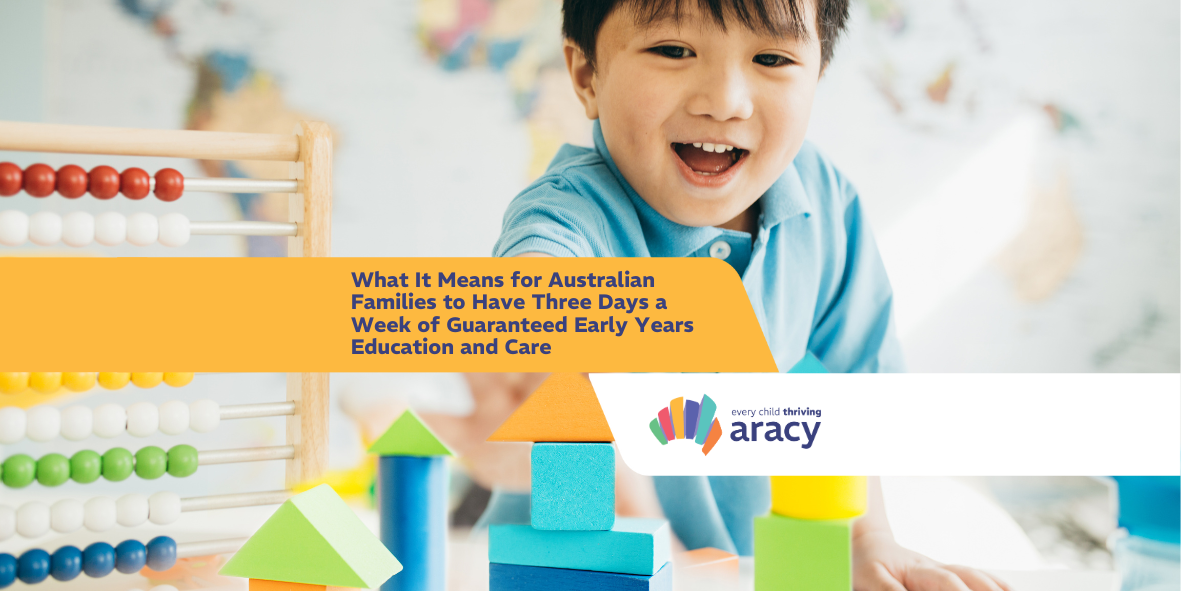
The Australian Government’s recent decision to guarantee three days a week of early childhood education and care (ECEC) is a significant step towards improving child wellbeing, workforce participation, and economic security. But what does this policy mean for Australian families?
At ARACY, we advocate for a high-quality, accessible, and equitable ECEC system that supports every child’s right to thrive. Here, we answer some of the most frequently asked questions about this initiative through the lens of our advocacy priorities and The Nest, Australia’s wellbeing framework developed by ARACY.
The Government’s Early Childhood Education and Care (Three Day Guarantee) Bill 2025 aims to ensure that all Child Care Subsidy CCS eligible families have access to a minimum of three days of subsidised early learning per week. Families caring for First Nations children eligible for 100 hours each fortnight for each child. The specifics of eligibility, funding models, and implementation details are still being discussed, but the core intent is to make ECEC more accessible and affordable for families across Australia.
At ARACY, we know that quality early learning experiences are essential for child development. This initiative aligns with The Nest, our wellbeing framework, by promoting:
For many families, inconsistent access to early years education and care limits their ability to work or pursue education. This policy could:
From January 2026, all families will be entitled to at least 72 hours of subsidised ECEC per fortnight (three days per week), regardless of their employment status or activity levels. Families may be eligible for additional hours depending on personal activity requirements
ARACY welcomes this step towards universal early learning access, ensuring all children benefit from consistent, high-quality ECEC. Children from disadvantaged backgrounds, in particular, experience significant developmental gains through regular participation in early learning.
While this initiative is a positive step, ARACY continues to advocate for:
The details of how this policy will be implemented are still emerging. ARACY will continue to engage with policymakers, researchers, and communities to ensure that the reforms prioritise child wellbeing and align with best practices in early learning.
Advocacy is key to shaping policies that benefit children. You can:
The guaranteed three days a week of child care is a step towards a better future for Australia’s children. But we must ensure that this policy is inclusive, high-quality, and sustainable. Together, we can build a system that enables all children to thrive.
SHARE THIS

With six connected areas, The Nest ensures young Australians have everything they need for the best start in life, helping them reach their highest potential.

Using The Nest, has helped ARACY to be at the forefront of disease prevention and the promotion of holistic health for young Australians.

Here you’ll see some examples of how The Nest has been used in organisations outside of ARACY across Australia.
Discover the latest in child and youth health and wellbeing through our newsletter. Subscribe now for ARACY news, events, and research updates.
Privacy collection statement
ARACY respects your privacy and is committed to protecting your personal information. When you interact with us, we may collect certain details to provide our services, such as your name and contact information. This information will only be used for purposes directly related to our business activities and will not be shared with third parties without your consent, except where required by law. By engaging with us, you consent to the collection and use of your information. For more details on how we handle your information, please refer to our full privacy policy.
ARACY acknowledges the Traditional Custodians and their enduring connection to the lands, waters, and skies. We pay our respects to Elders past and present and extend that respect to all Aboriginal and Torres Strait Islander people.
In solidarity, ARACY supports the Uluru Statement from the Heart and the need for truth-telling about the history and impact of colonisation. We treasure the rich and diverse cultures and customs of First Nations people – valued knowledge holders, leaders and partners in creating the conditions for all our children to thrive.